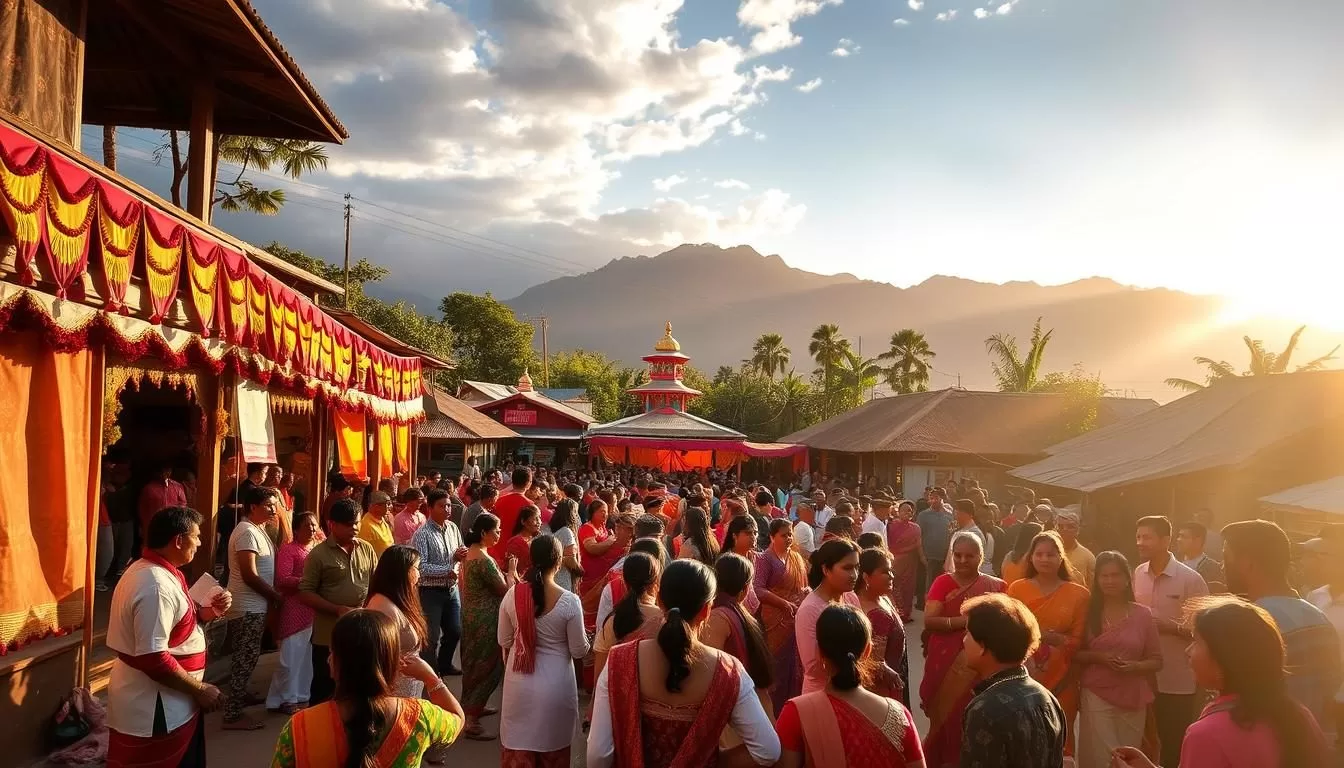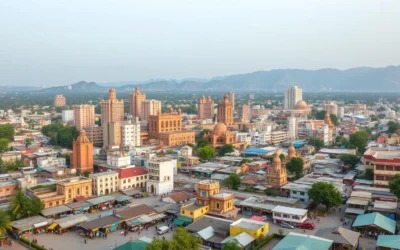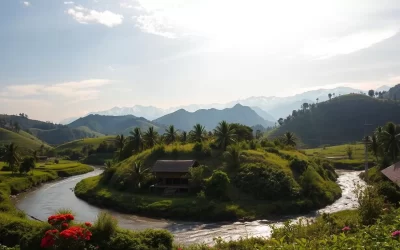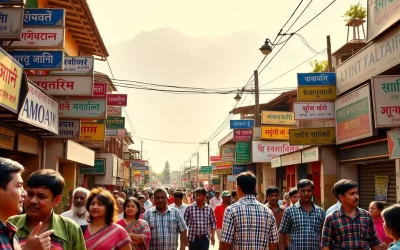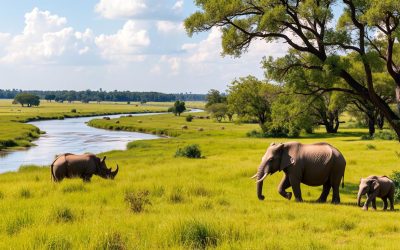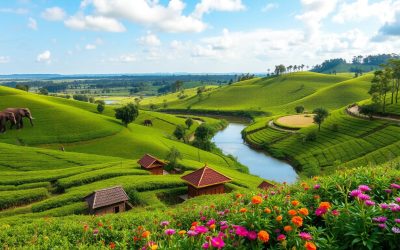✓ Accommodations✓ Flights✓ Rental Cars✓ Tours & Activities
Located in the northeastern part of India, Assam is a treasure trove of lush landscapes, tea plantations, and a rich cultural heritage. Experiencing the local festivals is one of the best ways to immerse yourself in the Assamese culture and connect with the friendly locals.
The festivals in Assam showcase a unique blend of religious traditions, agricultural celebrations, and cultural performances. By attending these events, you can witness authentic traditions, savor local cuisine, and participate in community celebrations, gaining a deeper understanding of the Assamese way of life.
From the widely celebrated Bihu to unique events like the Ambubachi Mela and Kaziranga Elephant Festival, Assam’s cultural experiences are diverse and captivating. With festivals occurring throughout the year, Assam is a year-round destination for cultural tourism, offering a chance to experience the state’s beauty and rich heritage.
The Cultural Tapestry of Assam
When you visit Assam, you’re not just witnessing a place, you’re experiencing a tapestry of cultural heritage. The state’s diverse traditions and vibrant festivals are a testament to its rich cultural identity.
A Land of Diversity and Tradition
Assam is a melting pot of cultures, with various ethnic groups contributing to its unique cultural landscape. The state’s festivals are an integral part of this cultural mosaic, reflecting the diverse traditions and customs of its people.
Why Festivals Are the Gateway to Assamese Culture
Festivals in Assam are immersive cultural experiences that engage all the senses. By participating in these festivals, you can interact with locals in authentic settings, gaining a deeper understanding of Assamese culture. The communal nature of these celebrations highlights the importance of community bonds in local people‘s lives.
| Festival | Celebration Time | Significance |
|---|---|---|
| Bihu | April | Celebrates the Assamese New Year |
| Ambubachi Mela | June | Celebrates the divine feminine |
| Majuli Festival | November | Showcases island culture and traditions |
Experiencing these festivals assam has to offer provides insights into the local way of life, beyond what guidebooks can offer. It’s a chance to witness firsthand how time-honored traditions are preserved and evolved.
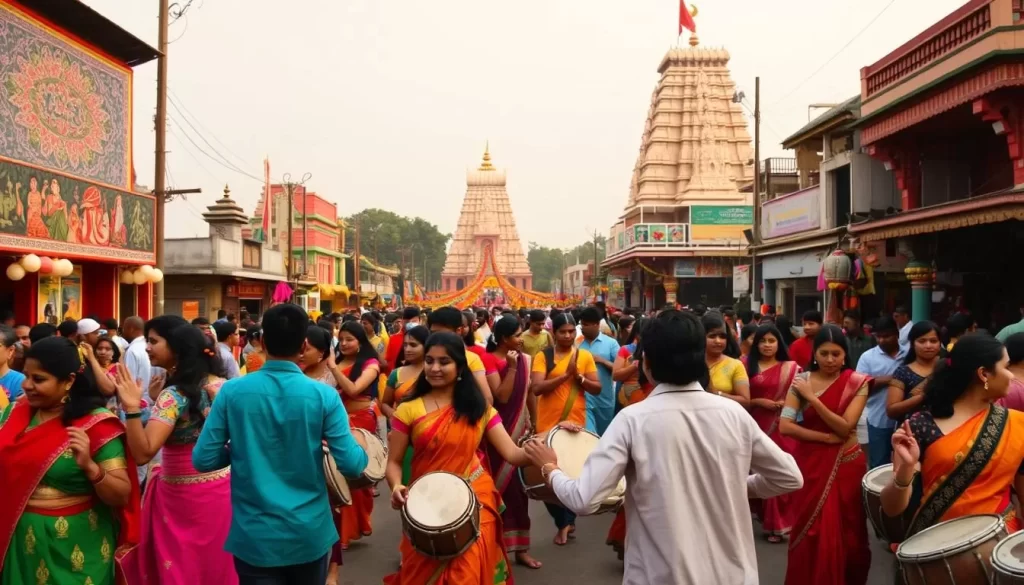
Bihu: The Heart of Assamese Celebrations
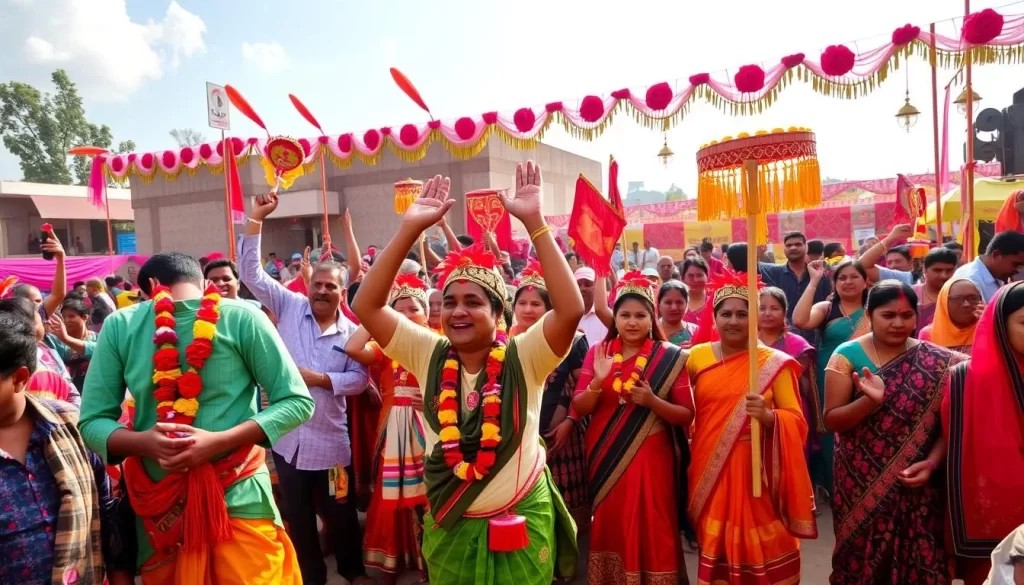
If you’re visiting Assam, experiencing Bihu is a must, as it reflects the state’s rich cultural heritage. Bihu is not just a festival; it’s a celebration that embodies the spirit of the Assamese people.
Bohag Bihu: The Spring Celebration
Bohag Bihu, celebrated in April, marks the beginning of the Assamese New Year and the onset of spring. It’s a time of renewal and joy, characterized by traditional dances, music, and feasting. The festival is a significant part of Assamese culture, symbolizing the region’s agricultural prosperity.
Magh Bihu: The Harvest Festival
Magh Bihu, observed in January, is a festival that celebrates the harvest season. It’s marked by the lighting of bonfires (Meji), community feasts, and traditional sports. This Bihu is a time for thanksgiving, reflecting the community’s gratitude for the year’s harvest.
Kongali Bihu: The Autumn Festival
Kongali Bihu, also known as Kati Bihu, is observed in October, during the lean agricultural period. It’s a more solemn festival, reflecting the anxiety of farmers as they await the harvest. The rituals include lighting earthen lamps (saki) in paddy fields to ward off pests and offer prayers for a good harvest. Additionally, people perform religious rituals at the household tulsi plant, considered sacred, to seek protection and prosperity for their crops.
Kongali Bihu highlights the deep connection between Assamese culture and agricultural cycles, showcasing how the community’s daily life and rituals are intertwined with the land and its produce.
Ambubachi Mela: The Divine Feminine Celebration
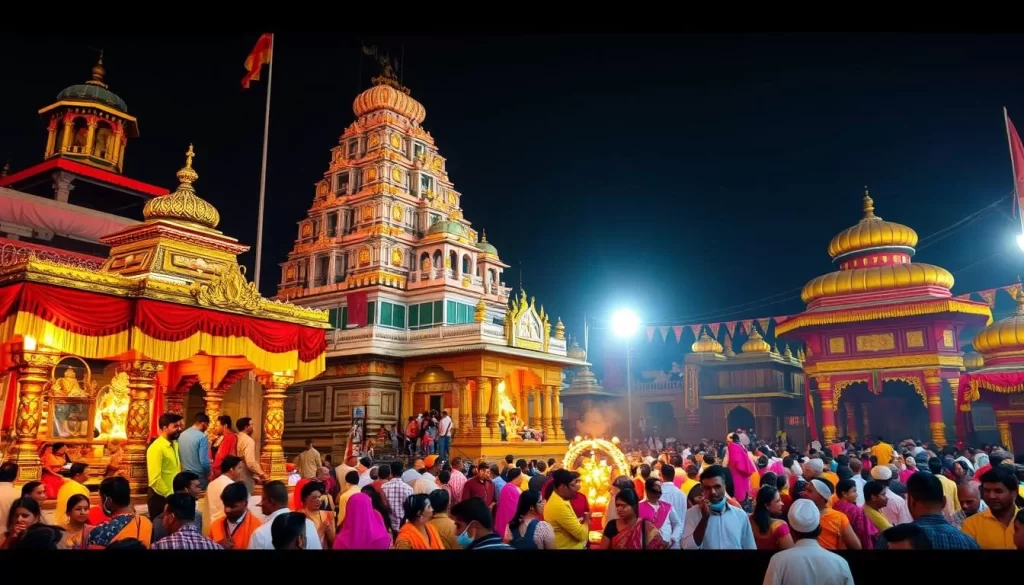
Celebrated with fervor and spiritual intensity, the Ambubachi Mela is a festival that honors the divine feminine energy. Held annually at the revered Kamakhya Temple in Assam, this event is a significant cultural and spiritual experience.
Rituals and Significance
The Ambubachi Mela commemorates the annual menstruation of the goddess Kamakhya, symbolizing fertility and the power of the divine feminine. During the festival, the temple is closed for three days, signifying the goddess’s menstrual period, and then reopened with great celebrations.
Visitor Experience at Kamakhya Temple
Visitors to the Kamakhya Temple during the Ambubachi Mela can expect a vibrant and intense spiritual experience. The temple, situated atop Nilachal Hill, offers a unique blend of architectural beauty and spiritual significance. As visitors enter the temple complex, they are greeted by colorful sadhus and tantric practitioners, adding to the festive atmosphere.
To make the most of your visit, consider arriving early to avoid the largest crowds. The surrounding area offers several vantage points to observe the festival atmosphere without the dense crowds. Additionally, you can explore the local culture by visiting nearby attractions and experiencing the traditional Assamese cuisine.
Majuli Festival: Celebrating Island Culture
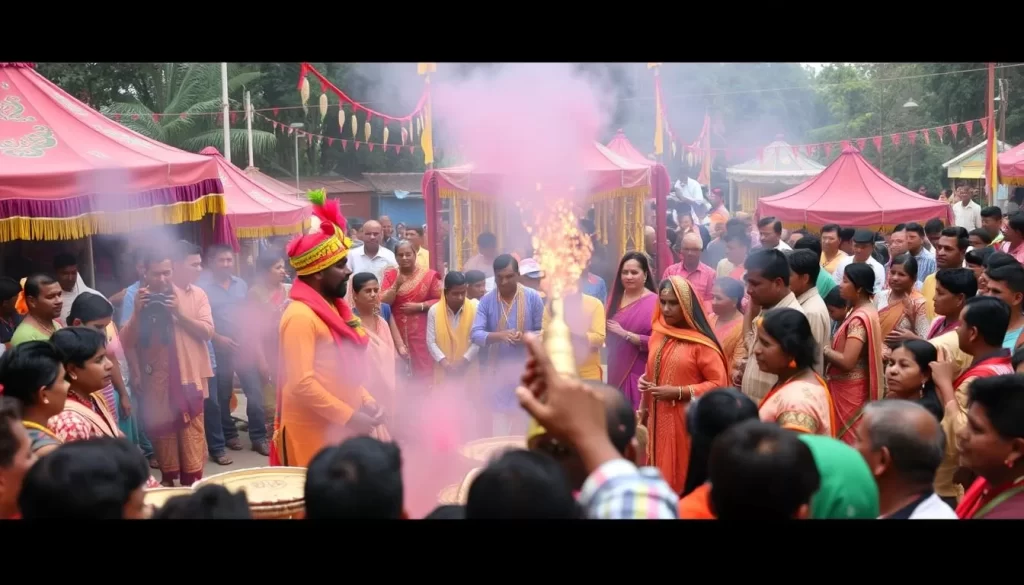
Majuli, the largest river island in the world, comes alive with the Majuli Festival, a spectacle of culture and heritage. This annual celebration is a testament to the rich traditions and diversity of Assam.
Cultural Showcases and Exhibitions
The Majuli Festival features a variety of cultural showcases and exhibitions that highlight the island’s unique heritage. You can witness traditional weaving demonstrations, showcasing the art of creating distinctive Assamese textiles like gamosa and mekhela chador.
The festival also includes a craft bazaar where you can purchase handmade items directly from artisans, including bamboo and cane craft displays that transform sustainable materials into useful and decorative items.
Experiencing Local Crafts and Cuisine
The festival offers a culinary journey through traditional Assamese cuisine, including tribal specialties that are rarely found elsewhere. You can savor signature dishes like fish tenga (sour fish curry), duck meat with ash gourd, and various types of pitha (rice cakes).
Cooking demonstrations allow you to learn about traditional Assamese cooking techniques and ingredients, giving you a deeper appreciation for the local food culture. The festival is an opportunity to experience the rich cultural heritage and warm hospitality of the people from different parts of Assam.
Ras Lila in Majuli: Lord Krishna’s Divine Play

Ras Lila in Majuli is a divine spectacle that showcases the rich cultural heritage of Assam. This traditional dance-drama is a reenactment of Lord Krishna’s divine play with the gopis, embodying the essence of love and devotion.
Traditional Performances and Devotional Expressions
The Ras Lila performances in Majuli are characterized by their devotional fervor and artistic finesse. Each performance is a blend of music, dance, and dramatic presentation, captivating the audience with its spiritual energy.
Satras and Their Cultural Significance
Satras are Vaishnavite monasteries established by Srimanta Sankardev and his disciples, serving as centers of religious, cultural, and artistic activities. Key aspects of satras include:
- Each satra in Majuli has its unique style of performing Ras Lila, with variations in music, dance, and dramatic presentation.
- Famous satras like Auniati, Kamalabari, and Dakhinpat are renowned for their Ras Lila performances.
- Satras have preserved ancient manuscripts and performance traditions over centuries.
- Satra monks undergo rigorous training in performing arts from a young age.
- Visitors can experience satra life during the festival time, with some offering accommodations.
During your visit to Majuli at the right time, you can immerse yourself in this rich culture and witness the divine Ras Lila, making your experience truly unforgettable.
Dehing Patkai Festival: Adventure and Wildlife
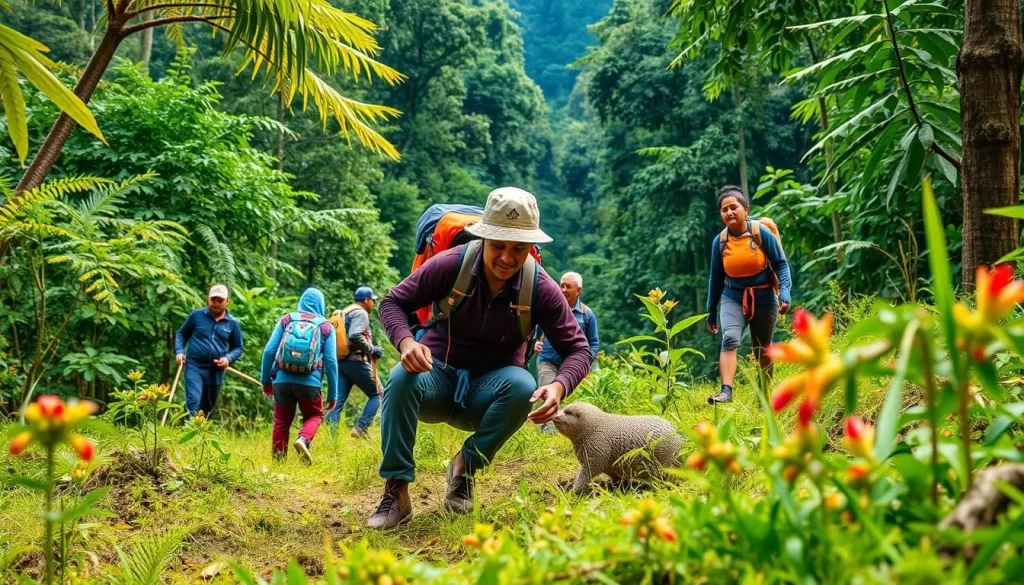
Experience the beauty of Assam’s rainforest like never before at the Dehing Patkai Festival. This unique celebration offers a blend of adventure sports and wildlife exploration, making it a must-visit event for thrill-seekers and nature enthusiasts alike.
Adventure Sports and Activities
The Dehing Patkai Festival is an adrenaline junkie’s paradise, with a range of adventure sports and activities that let you immerse yourself in the thrill of the rainforest. From trekking through dense foliage to camping under the stars, there’s something for every kind of adventurer.
Wildlife Experiences and Elephant Safaris
The festival offers unforgettable wildlife experiences, including elephant safaris that allow you to explore the rainforest from a unique vantage point. You can also enjoy guided nature walks led by local experts, who help you identify medicinal plants and understand forest ecology. Additionally, the area is known for its avian diversity, making it a paradise for bird watchers.
- Explore the rainforest on an elephant safari, getting up close to the natural beauty of Assam.
- Spot rare species like hoolock gibbons, slow loris, and various hornbill species during wildlife watching opportunities.
- Participate in guided nature walks to discover medicinal plants and learn about forest ecology.
- Enjoy bird watching in an area renowned for its rich avian diversity.
- Attend conservation talks and workshops that raise awareness about protecting the region’s biodiversity.
- Learn about responsible wildlife tourism practices that minimize impact on natural habitats.
By attending the Dehing Patkai Festival, you’re not only experiencing the world of Assam’s rainforest but also contributing to its conservation. It’s a celebration that brings people together to appreciate and protect the natural beauty of this incredible region.
Assam Tea Festival: Celebrating the World’s Finest Brew
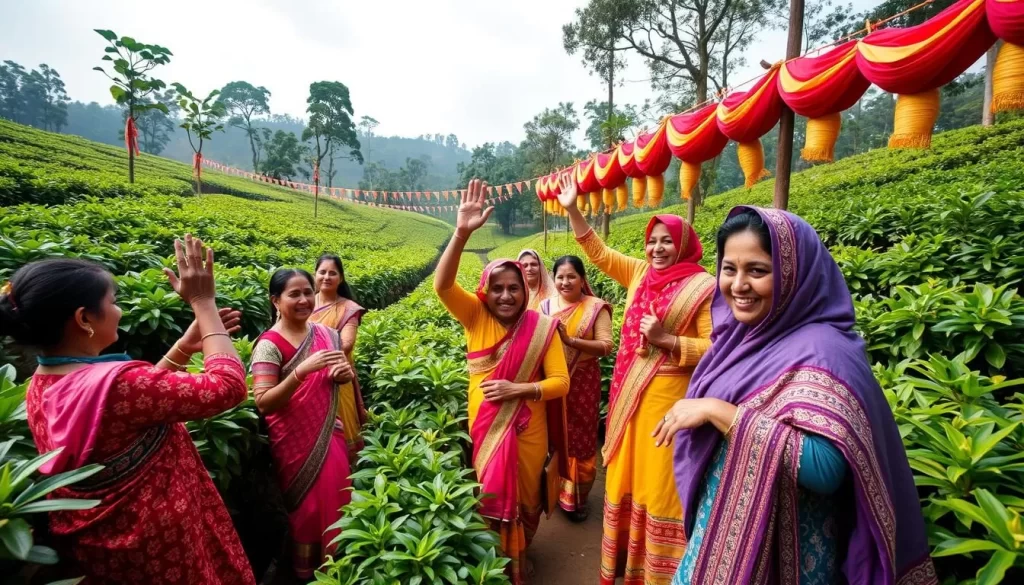
As you step into the Assam Tea Festival, you’re immersed in a world where tea, culture, and celebration blend seamlessly. Held in Jorhat, this festival is a spectacular event that showcases the rich heritage of Assam’s tea plantations.
Tea Tasting and Garden Tours
The Assam Tea Festival offers an immersive experience with tea tasting sessions and guided garden tours. You get to explore the lush tea gardens, understanding the process from leaf to cup. The festival highlights the distinct flavors and qualities of Assam tea, making it a paradise for tea enthusiasts.
Cultural Performances by Tea Tribes
The festival features vibrant cultural performances by tea tribe communities. Their ancestors were brought to Assam from central India during the colonial era to work on tea plantations. The Jhumur dance and songs tell stories of plantation life, love, and community bonds, reflecting the blending of tribal traditions with Assamese influences over generations.
Performers wear colorful traditional attire with distinctive jewelry and headgear, accompanied by rhythmic drumming and energetic movements. These cultural showcases not only preserve the unique heritage of tea garden communities but also invite audience participation, creating an interactive experience.
Brahmaputra Beach Festival: Riverside Revelry
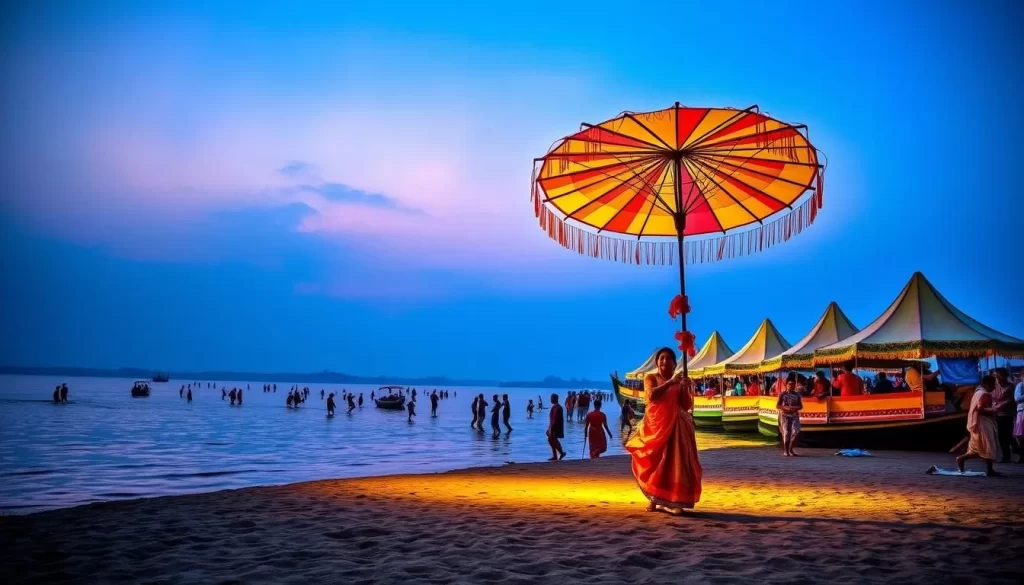
Join the revelry at the Brahmaputra Beach Festival, where the beauty of the Brahmaputra River meets vibrant culture. This unique event is a celebration of the rich cultural heritage of Assam, blended with the excitement of riverside activities.
Water Sports and Adventure Activities
The Brahmaputra Beach Festival isn’t just about cultural experiences; it’s also a hub for adventure seekers. You can enjoy a variety of water sports and activities that add an adrenaline rush to your visit. From boating to other water-based adventures, there’s something for everyone.
Cultural Showcases and Local Cuisine
The festival is a showcase of Assam’s rich cultural tapestry, featuring traditional dance forms, folk music concerts, and a food festival with authentic Assamese cuisine. You can savor local delicacies, including river fish specialties, and explore handicraft exhibitions selling traditional items like jaapi and gamosa.
The event also includes fashion shows featuring traditional Assamese attire with contemporary adaptations, evening cultural programs with bonfires, and community dining that creates a festive atmosphere. Moreover, the festival provides significant economic opportunities for local food vendors, craftspeople, and performers, making it a vital part of the community.
Kaziranga Elephant Festival: Celebrating the Gentle Giants
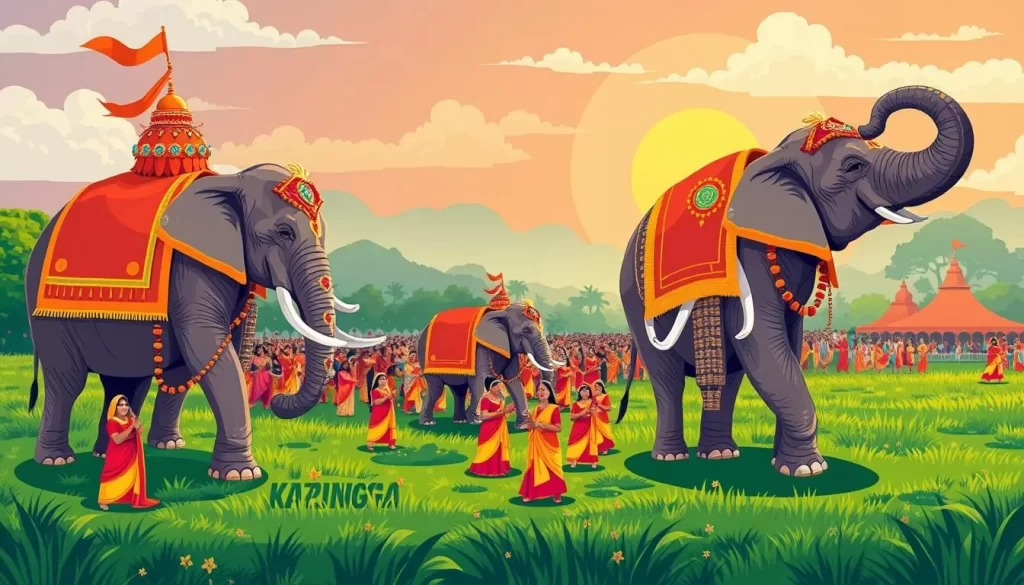
As one of the famous festivals in Assam, the Kaziranga Elephant Festival highlights the importance of elephant conservation. This vibrant celebration honors the majesty of elephants and brings people together to appreciate these gentle giants.
Elephant Parades and Competitions
The Kaziranga Elephant Festival features elephant parades and competitions that are both entertaining and educational. These events showcase the majesty of elephants and highlight their importance in Assam’s culture and ecosystem.
Conservation Awareness and Eco-Tourism
The festival includes various conservation activities such as talks, workshops, photo exhibitions, and documentary screenings. These events feature wildlife experts and forest department officials discussing elephant conservation challenges and successes. The festival promotes eco-tourism practices that benefit both animals and local communities.
Visitors can participate in fundraising activities for elephant conservation projects and learn about human-elephant conflict mitigation strategies. Local schools and community groups also participate in conservation-themed activities, promoting a culture of conservation.
Baishagu Festival: The Colorful Bodo Celebration
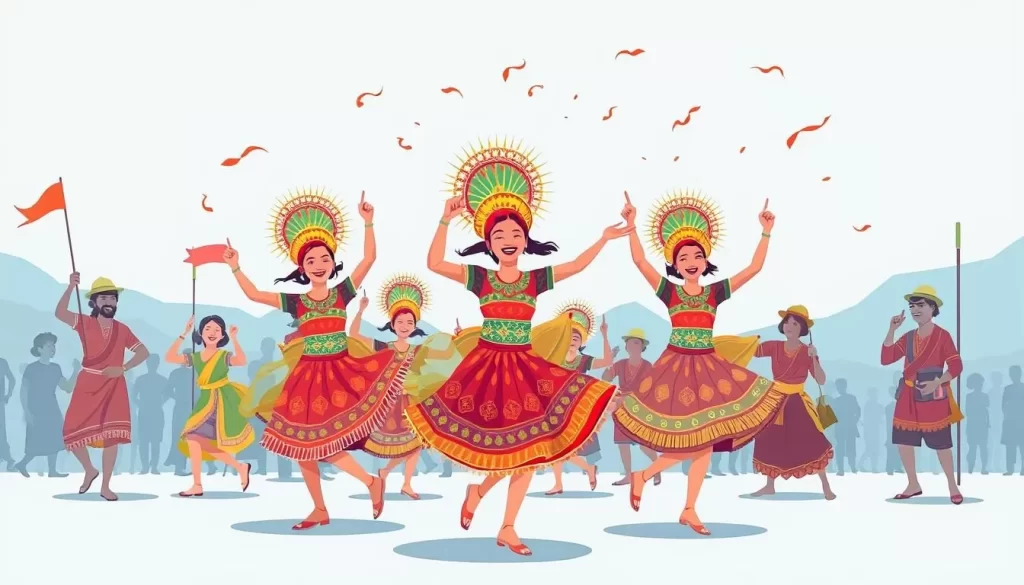
Baishagu, the spring festival of the Bodo community, is a spectacle of joy and cultural richness. As you experience the Baishagu Festival, you’ll be immersed in the vibrant traditions of the Bodo people, showcasing their rich cultural heritage through music, dance, and communal celebrations.
Traditional Rituals and Prayers
The Baishagu Festival begins with traditional rituals and prayers, where the community comes together to seek blessings from their deities. You will witness the elders performing sacred rituals, followed by prayers for prosperity and well-being. These rituals are a significant part of the festival, reinforcing the community’s spiritual connection and cultural identity.
The Bagurumba Dance and Community Celebrations
The highlight of the Baishagu Festival is the Bagurumba dance, performed by young women in colorful traditional attire. The dance is characterized by distinctive movements that mimic butterflies and birds, accompanied by traditional instruments like the kham (drum) and sifung (flute). As you watch the dance, you’ll be captivated by the grace and energy of the performers.
The entire community participates in the celebrations, with elders blessing the young and people exchanging gifts. The festival features communal feasts where traditional Bodo dishes like onla (rice beer), narzi (fish preparation), and mwithanga (pork with rice flour) are served. You will have the opportunity to savor these local delicacies and experience the warmth of Bodo hospitality.
Planning Your Visit to Assam, India: Top Festivals to Check Out When Visiting
The festivals of Assam are a window into the soul of this incredible state, and planning your visit around them can make your trip truly unforgettable. To make the most of your experience, consider the timing of your visit and be prepared for the unique aspects of each celebration.
Best Times to Visit for Festival Experiences
Assam hosts various festivals throughout the year, each with its own significance. The Bohag Bihu in April is a highlight, marking the Assamese New Year, while the Magh Bihu in January celebrates the harvest season. Planning your visit around these events will give you a deeper insight into the local culture.
Practical Tips for Festival Attendance
When attending festivals in Assam, it’s essential to be prepared. Here are a few tips to enhance your experience:
- Dress modestly for religious events and wear comfortable clothing for outdoor celebrations.
- Be mindful of photography etiquette, especially at religious ceremonies where restrictions may apply.
- Consider hiring a local guide to provide cultural context and help navigate language barriers.
- Stay safe in crowded venues, particularly if you’re traveling with children or elderly companions.
- Be aware of dietary options and communicate any restrictions to vendors.
- Pack essentials like sun protection, rain gear, and comfortable footwear depending on the season.
- Engage respectfully with local communities by learning appropriate greetings and behaviors.
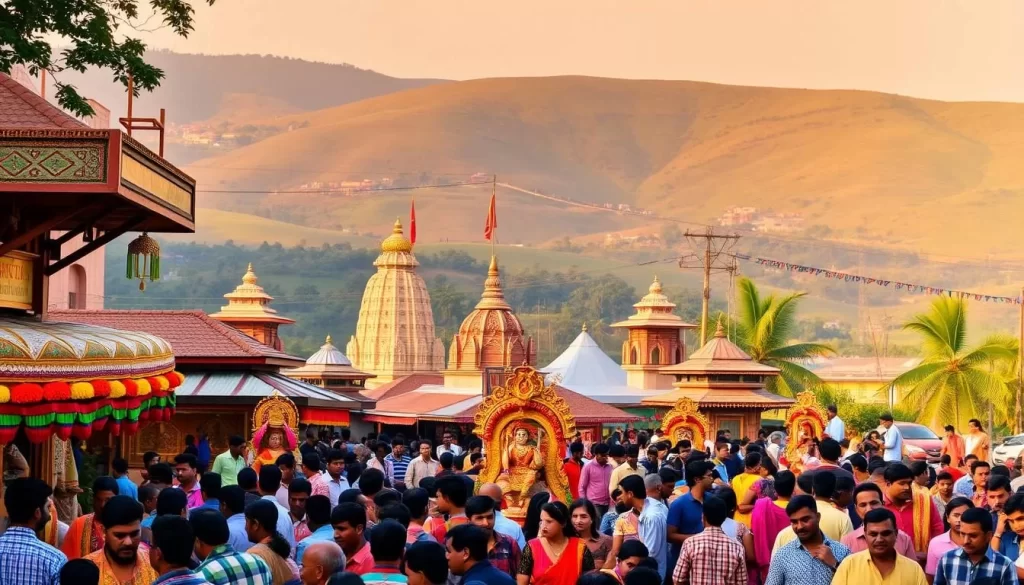
Conclusion
Assam’s festivals are a window into the soul of this incredible region, revealing its history, traditions, and community values. The rich diversity of festivals in Assam offers a unique cultural experience, allowing travelers to connect with the Assamese people and their way of life.
The natural beauty of Assam forms a stunning backdrop for its cultural celebrations, from riverside festivals to jungle elephant parades. As festivals assam continue to evolve, they maintain their core traditions while adapting to contemporary contexts.
Visitors are encouraged to approach Assamese festivals with curiosity, respect, and openness to new experiences. By doing so, they not only create lifelong memories but also contribute to the local economies and help preserve cultural practices. Beyond the tourist attractions, Assam’s festivals reveal the culture and soul of the place, making it a truly unforgettable destination.
The above is subject to change.
Check back often to TRAVEL.COM for the latest travel tips and deals.
